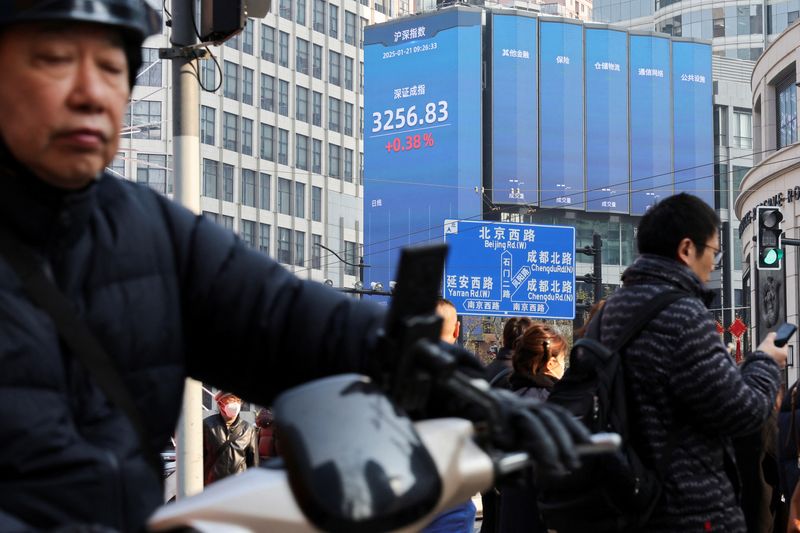By Samuel Shen and Jiaxing Li
SHANGHAI/HONG KONG (Reuters) -Chinese stocks and the yuan tentatively rose on Tuesday, with investors relieved that U.S. President Donald Trump did not announce hefty trade tariffs at his inauguration but unwilling to bet this meant improved U.S.-Sino relations.
Trump returned to the White House on Monday with an ambitious agenda spanning trade reform, immigration, tax cuts and deregulation. He did not target China in his inauguration speech nor did he immediately impose tariffs as previously promised, sparking a relief rally in global stocks and a drop in the dollar.
At the same time, Trump directed federal agencies to “investigate and remedy” persistent U.S. trade deficits and unfair trade practices by other countries, and said he might impose 25% tariffs on imports from Canada and Mexico on Feb. 1.
Trump also signed an executive order delaying the enforcement of a ban on popular short-video app TikTok, but said he might impose tariffs on China if Beijing does not approve a potential U.S. deal with TikTok.
China’s blue-chip Index climbed about 0.8% at the open, but was soon trading flat. The yuan was about 0.3% higher against a broadly weaker dollar.
Trump’s start to his presidency “is better than I expected,” said Charles Wang, chairman of Shenzhen Dragon Pacific Capital Management Co.
Referring to the bitter trade and geopolitical tensions between the world’s two biggest economies during Trump’s first term as president, Wang said he felt Trump was more pragmatic towards China and more focused on domestic politics.
Yet, investors should “watch as you walk”, Wang said.
“You don’t expect Trump’s inauguration to trigger a big rally, as it’s unrealistic for Sino-U.S. ties to suddenly reverse … and you don’t read too much into the words of Trump, who is very fickle,” he said.
Yuan Yuwei, founder and chief investment officer of Water Wisdom Asset Management, called Trump’s return “marginally positive” and expects the new president to be less stringent in his crackdown on China than predecessor Joe Biden, who “sought to strangle China to death.”
The CSI300 index has dropped roughly 5% since Trump won the election on Nov. 5 with a threat to impose steep tariffs of 60% on Chinese goods, but had already rebounded over the past week amid gestures of goodwill between Beijing and Washington.
The yuan has weakened roughly 3% against the dollar since Trump’s victory but is trading near its strongest in two weeks, buoyed by a friendly call between Trump and Chinese President Xi Jinping.
DELAYED, NOT DEFERRED
Despite those signs of a thaw in the frigid relations, Trump’s first moves included ordering a review of the Phase 1 trade deal he signed with Beijing in 2020, whose conditions China has not been able to meet.
If tariffs are hiked eventually, that could deal a heavy blow to the world’s second-largest economy, which has been struggling with a protracted property crisis and weak consumer demand weighing heavily on economic activity.
“As there are unsolved issues between the U.S. and China, dodging tariffs right now does not mean it will not happen in the future. This means China-related assets will still be pressured by geopolitics and U.S. domestic policies,” said Gary Ng, economist at Natixis.
During Trump’s first term as president, the yuan weakened more than 12% against the dollar during a series of tit-for-tat U.S.-Sino tariff announcements between March 2018 and May 2020, while the CSI 300 index tumbled as much as 30% from peak to trough during the period.
Natixis’s Ng said he expected divergence in mainland stocks as investors switch from “made-in-China” to “made-by-China” companies.

Tech shares rose in China as investors bought into chipmakers, artificial intelligence companies and robot producers, betting they will benefit from Beijing’s self-efficiency drive. Shares of home appliance makers and car producers also gained on hopes Beijing’s consumption stimulus will bolster sales.
“The only policies China can adopt to cushion the impact of Trump’s tariff and tech curbs are to boost consumption, deepen reforms and upgrade technology,” said Wen Hao, a stock trader in eastern Hangzhou city, who prefers consumer and tech stocks.
Source link

















